- Home
- Gary Corby
Death on Delos Page 8
Death on Delos Read online
Page 8
“Have you eaten?” I asked Diotima.
“Do you mean, did I stop for breakfast while hurrying to a murder scene? No.”
I helped my wife to stand up. “You need to keep up your strength if you’re going to grow a baby and solve a murder.”
Apollo’s Rest
We ate in the village, for the simple reason that it was the only place to find food.
In every other town, village, and city in Hellas there is always a temple in close proximity to the agora. On Holy Delos, another temple would have been surplus to requirements; there were three major temples and the birthplace of two gods just up the road.
Instead, there was something much more important as far as I was concerned: a very good tavern.
No village as isolated as the one on Delos has any right to a tavern like Apollo’s Rest. It was small, but clean—maybe the cleanest tavern I’d ever seen—even the straw on the floor smelled like it had been recently replaced.
The woman within was plump, buxom, and friendly.
“You’d be the visiting priestess and her man. I’ve been expecting you,” she said.
I was surprised. “You have? How did you know we were coming?”
“Well, there isn’t anywhere else to eat, is there?” she said, reasonably enough.
“Good point.”
“My name’s Moira. Take a seat.”
We took the best seats in the house, which was easy because every bench in the place was empty but for one. The captain of Paralos sat in a corner, alone, with a bowl of food and a mug of wine to keep him company.
He nodded to us and said, “Kalimera, my friends.”
“Good morning,” Diotima replied.
Moira noted the direction of our gaze. She said, “He’s a fine-looking man, ain’t he?”
“Indeed, he is,” Diotima said.
I was instantly jealous.
Moira hefted her expansive bosom a notch higher and went to see if there was anything else she might do for the captain, being careful to lean well forward as she did.
Moira in our language meant fate. It wasn’t the most common name for a woman.
“Have you noticed how the locals take divine names?” I said.
“What do you mean?” Diotima said.
“The village head man is Damon.” In Greek that meant a genius, evil or otherwise.
“So?”
“Our hostess is Moira—fate. Someone wrote ‘nemesis’ above the corpse. Do you get the feeling this place is obsessed with the human condition?”
“This is Delos, you know. You’re reading too much into it, Nico. Anyway, it’s not that unusual. My own name means Honored by God.”
“The perfect name for a priestess,” I said. “It suits you.”
Our hostess—who apparently was Fate personified—brought us watered wine, bread, and goat cheese.
“One of the few things we got enough of on this island is goats,” said Moira. “They help keep down the weeds. Enjoy the cheese.”
I asked how such a fine tavern came to be in such a place, meaning no disrespect.
“None taken,” she said good-naturedly. “There ain’t many people on Delos, but we get a lot of visitors, and you know what? They all like wine.”
“They certainly do.” I held out my cup for more. “Where is everyone?” I asked as she poured.
“In mourning,” Moira said shortly.
“Oh.”
Diotima and I were so used to untimely death that it hadn’t occurred to us.
“This is the first death we’ve had in years,” Moira said. “No one’s quite sure what to do. Everyone’s playing safe, to make sure they do the proper amount of mourning, you know?”
“I know what you mean,” I said. In Hellas, the rituals for the dead were such a big thing that everyone worried what the neighbors would think if you didn’t show enough outward grief. So everyone compensated by going completely overboard.
“There won’t be anyone out doing business today anyway,” Moira said. “Not with the temples shut down on account of the pollution.”
“I notice you haven’t shorn your hair,” Diotima said. “Didn’t you know Geros?”
“I knew him all too well,” Moira said. “The fact is, I won’t be shedding a tear.”
“You didn’t get on?” Diotima asked.
“Nobody liked Geros. He wasn’t the sort of man you’re supposed to like, you know?”
I knew.
“But you had to respect him,” Moira concluded. She tucked the amphora of wine under a meaty arm and returned to her place behind the counter.
Diotima had her scrap of papyrus out. She stared at her notes and frowned.
“What are you thinking?” I asked.
“That I’m confused,” she said. “Let me say the order of events leading up to the crime.”
“Sure.”
“The Athenians landed yesterday afternoon, with you and me arriving first on Paralos. We delivered the year’s offerings, and Pericles delivered the news that he was removing the treasure. This came as a complete surprise to the Delians. Geros was present to hear these things.”
“Does that help?”
“Only in that it means Geros wasn’t prepared for our arrival. I thought he was astonishingly quick at organizing the resistance.”
“If you think Geros had some advance warning, you can think again,” I said. “The vote among the Athenians to remove the treasure came only the day before the fleet departed. Any boat that beat us here would have to have been very, very quick.”
“I see your point,” Diotima said. “Yet Geros didn’t stop to think for a moment. His instant reaction was that the treasure must not be removed.”
“He likes having treasure around. Who doesn’t?” I said.
“Let’s move on, then,” Diotima said. “Geros organized the resistance, which was effective. So effective that Pericles decided to bribe Geros.” My wife glared at me.
“We’ve already been over that.” I winced at the thought of having that argument again.
“But the details are important. You wandered in the dark, stubbing your toes on the sanctuary wall.”
“They still hurt,” I complained.
“I’ll rub some ointment on them later,” Diotima said absently. “Meanwhile, Geros had passed through the gate. The gate which had been oiled.”
“Who oiled it?” I asked.
“Someone who didn’t want that gate to squeak,” Diotima said. “I already have that question on my list.”
“The only thing special about that gate is that it leads to the abandoned village. Why was the old village abandoned?”
“We’ll have to ask.” Diotima scribbled another note, ran out of space, and turned over the papyrus. “Then you, Nico, saw a light in the distance.” Diotima paused. “Are you sure that light was in the old village?”
“Where else would it be?”
“How about on the boat whose track we saw in the sand?”
“I like that idea,” I said. I thought about it. “It’s possible. You can’t tell distance in the dark. If it was on the boat, that would explain why Geros didn’t see it.”
“Are you sure Geros didn’t?”
“When I pointed it out, he acted like he didn’t believe me.”
“Maybe,” Diotima said. She wasn’t convinced. “When you ran into Geros he was coming the other way.”
“Yes.”
“Why?”
“Obviously he’d finished whatever he’d gone to do out there,” I said.
“Then he must have been quick about it. Did you lose much time following him?”
“No,” I said at once. “The only delay was when I hit the wall, and of course he moved faster because he knew the terrain. Still, I can’t believe he had much time for
whatever he was about. I assume neither of us believe he was out for a casual stroll.”
“In the pitch black through a graveyard?” Diotima scoffed. “Thanks anyway.”
“Then Geros did whatever he did, and I caught him on the return journey. The rest, you know.”
Diotima consulted her notes.
“The window in which Geros could have been killed is actually very small,” she said. “He was alive when you left him. At least, I assume he was still alive, unless you did it.”
“Very funny.”
“All right then. When you left Geros, which way did he go?”
“Toward the village. I told you that.”
“Yes, but think about the timing,” Diotima said. “You agreed to meet again at dawn. Dawn wasn’t all that far away, was it?”
I thought about it.
“Just far enough away to be annoying. Not enough time to rest.”
“You found your way back to the navy boats. You talked with Pericles, and by the time you finished with him it was time to return.”
“Correct.”
“Then why did Geros walk back to the village, if he knew he’d only have to turn around almost at once?”
It was a good question.
“I don’t know,” I said. “Maybe he didn’t go all the way to the village. What else is in that direction?”
“The temple complex, of course,” Diotima said.
“I think you must be right.”
“When you left the temples, there were still men about the fires.”
“Yes.”
“Were the fires still going, after you parted from Geros?” Diotima asked.
I cast my mind back. “I don’t recall seeing the glow,” I said. “But then, I wasn’t looking either. There may have still been people there. They might have seen Geros.”
“We’ll have to ask around.” Diotima wrote another line on her list.
“I’m more interested in the writing on the wall,” I said. “Surely that’s our biggest clue. Why ‘Nemesis,’ I wonder? Why paint any message at all?”
“Under the circumstances, why not?” Diotima said. “The goddess Nemesis awards to every mortal the fate that their actions deserve. She is the bringer of divine retribution. Rather appropriate for Geros, don’t you think? He was willing to sell out Apollo and Artemis.”
It was a fair point.
“Also, Nemesis is the daughter of Nyx, the night,” Diotima added. “And Geros was killed by an assassin in the night.”
“You think there’s someone out there who fancies themselves to be Nemesis?” I asked.
“Who thinks of themselves as the agent of Nemesis,” Diotima said. “It makes sense, Nico.”
I asked, “Is there a temple to Nemesis on the island, by any chance?”
Diotima shook her head. “No, but there is a history between Apollo, Artemis, and Nemesis.” She paused. “It’s not a very pretty story, I’m afraid.”
“Nor are most murders,” I said.
“The story goes that long ago, in Phrygia, Queen Niobe boasted that she was a better mother than divine Leto, beloved of Zeus, because Niobe had had seven sons and seven daughters, while Leto had had only two children. But those two were Apollo and Artemis.”
“Hubris is not normally a good idea,” I said.
“No,” Diotima agreed. “The Gods were outraged by Niobe’s arrogance, Zeus in particular, since he was the father of the slighted children. Annoying Zeus is just . . . not a good idea.”
“No.”
“Zeus sent Nemesis to deal with Niobe,” Diotima said.
“Nemesis killed Niobe?”
“Worse than that,” Diotima said. “Nemesis brought Niobe’s words to Leto. Leto in turn asked her children Apollo and Artemis to kill the children of Niobe, which they did with far-flying arrows. Apollo executed the boys, Artemis shot the girls, all but one. In despair, Niobe asked for her life to be ended. Nemesis turned her to stone, but a stone which wept forever.”
“Nemesis is not one for compassion, then,” I said.
“Not even slightly,” Diotima agreed. “Nico, if there’s someone on the island acting as Nemesis, then they will kill without mercy.”
On that cheery note, Diotima finished her breakfast, put down her bowl, and said, “I’m hungry.”
I wasn’t surprised. She had been eating non-stop for the last couple of months.
Diotima ordered a second breakfast from Moira. Our hostess eyed Diotima’s tummy and said, “Aye, I know just what you need,” and brought the largest bowl of cheese and fruit that I had ever seen.
I noticed that the captain of Paralos had smiled to himself when this happened. I realized that he had been sitting there throughout our conversation, having finished his meal, slowly sipping a cup of watered wine. Diotima and I hadn’t made that big of an effort to keep our voices down; I guessed that he had been listening in.
I rose and crossed the room to speak with him.
“Kalimera, Captain.”
“Kalimera, Nicolaos.”
He remembered my name, but I couldn’t recall his.
“Semnos,” he said, when he realized my difficulty. “My name is Semnos.”
We had only been on his boat for a day, and that as passengers. I complimented Semnos on his memory for names and faces.
“It’s a job skill,” he said modestly. “Paralos is sent on missions to honor the gods at temples and sanctuaries all around the Aegean. Sometimes I go places I haven’t been for three years or more.”
“Yet you seem at home here,” I commented. Semnos did indeed look entirely relaxed within the local inn.
“Oh, I do regular runs to Delos,” the captain said. “It’s one of the major sites. There are Apollo and Artemis here on Delos, Artemis at Ephesus in Ionia; in Rhodes I represent Athens in the worship of Helios; on Samos we go to adore Aphrodite.”
“You’re busy,” I commented.
“That’s just the half of it. Then there are the Dionysian rites, the mystery cults, and the orgia,” Semnos said. “You need to be fit for those, I can tell you.”
“What? All of the rites?” I said, startled. There must be a hundred temples across the civilized Hellene world, and every one of them has its own celebrations. I said as much to the captain.
“I’m sent to all the main ones,” he said. “The Dionysiac rites in Arcadia, the fertility rites of the goddess Bendis in Thrace, the crazed erotic dances for Cybele in Samothrace . . . there are a lot of them.” Semnos sighed.
“You get sent by the navy to attend orgies?” I said, incredulous. I wondered how a man got a job like that. The queue when the position became vacant must be mind-boggling. I suggested as much to the captain.
“There are certain personal requirements that limit the applicants,” he said delicately.
I was struck again by just how very handsome was the captain of Paralos. Even I thought he was good looking.
“Women must throw themselves at you,” I agreed.
“Men too. You should see what happens at parties.”
I decided not to go there.
“For all those places where the religious celebrations can become a little . . . shall we say . . . exuberant, if it’s a rite in which Athenian participation is required, then I and the crew of Paralos are the men for the job.”
“The rest of the navy must be jealous of you,” I said.
The captain’s shoulders slumped a little at my words. “Whether or not they’re jealous I don’t know, but I can tell you what they say about us. They call us the pretty boys.”
“Not without foundation,” I commented.
“This I grant.” Semnos made an elegant, sweeping gesture of his arm in acquiescence, so smooth it would not have looked out of place on stage. “But can we help it if we’re forbidden to partake i
n any fleet action?”
“Is that a problem?” I asked.
“Is it a problem?” he repeated, incredulous at my question. “Surely you jest. Yes, it is. They call us the pretty boys, but they call us another word, too, an ugly one. The other sailors call us . . . cowards.”
“That’s tough,” I said.
“Every fitting on our ship is made of gold,” Semnos said dejectedly. “My standing orders are to never, ever risk Paralos.”
“That does make sense,” I consoled him.
“You have no idea what a disaster it is. Only last month, Paralos, Harpy, and another boat were in transit to Crete. We ran into pirates, not far from here in fact. Do you know what happened?”
“I feel sure I’m about to learn.”
“I was forced—forced, mind you—to turn around and head the other way. Like a . . . I can barely say the word . . . like a coward.” The captain might almost have wept. “Harpy and her escort carried on and destroyed the pirates. They were commended later.”
“Sorry about that.”
“And on the same day, the other sailors jeered my men.”
“You were obeying orders,” I pointed out.
“Does that make it any better?” Captain Semnos said.
If I was hearing this correctly, the good captain was depressed because he was required to attend orgies instead of risk his life on the seas.
“You could transfer to another ship?” I suggested.
“I tried,” he said morosely.
“They turned you down?”
He nodded. “Can I help it if I’m the most handsome man in Athens? They said my particular talents were needed on Paralos.”
I tried hard not to imagine the Captain’s particular talents. “What will you do?” I asked.
Captain Semnos squared his shoulders. “I must carry on, and serve where my state needs me,” he said stoically.
Diotima finished the cheese, fruit, bread, and wine, then we left the tavern. I would have liked to stay longer, but Diotima and I wanted to discuss suspects, and we both knew that every word we said in Moira’s presence would be repeated across the island before lunch.
So we sincerely thanked Moira for the breakfast, and departed for our cottage. I lay down on the bed at once. I was so tired that I almost fell asleep in a heartbeat.

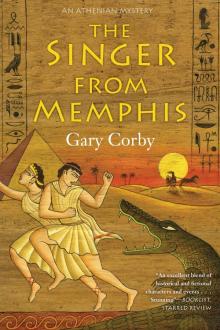 The Singer from Memphis
The Singer from Memphis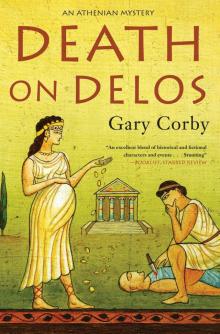 Death on Delos
Death on Delos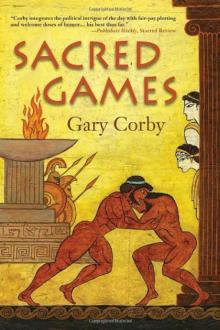 Sacred Games
Sacred Games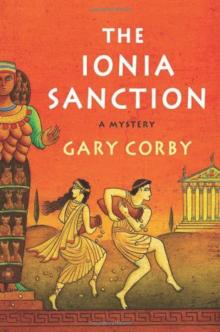 The Ionia Sanction
The Ionia Sanction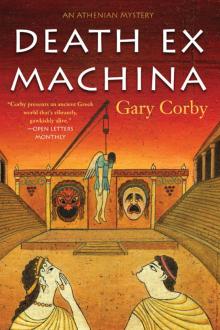 Death Ex Machina
Death Ex Machina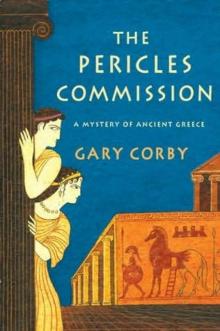 The Pericles Commission
The Pericles Commission